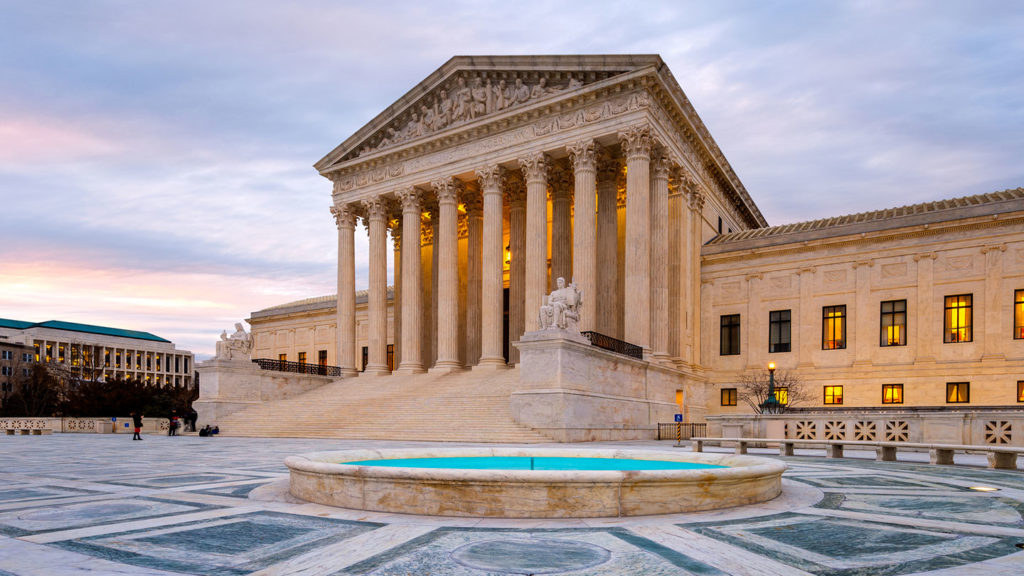
The immediate fate of a federal vaccine mandate covering most U.S. healthcare workers was in the hands of the Supreme Court this weekend, as the Biden administration sought to reverse an injunction preventing the rule from taking effect in much of the country.
U.S. Solicitor General Elizabeth Prelogar, acting on behalf of the Department of Justice, asked the High Court late Thursday to walk back a lower court decision that is blocking the rule in 24 Republican-led states. State attorneys general had sued to block the law in two separate actions, each claiming the federal government had overstepped its authority and violated states’ rights.
The Centers for Medicare & Medicaid Services rule at issue is one of three federal vaccine mandates devised by the Biden administration to address the nation’s ongoing public health emergency.
On Friday, a federal appeals court reinstated a rule requiring companies with 100 or more employees to mandate COVID-19 vaccines or implement testing, saying the Occupational Safety and Health Administration was likely acting within it authority in designing the emergency temporary standard. On Saturday, South Carolina appealed that decision to the Supreme Court, while several groups sought emergency protections.
For most long-term care providers, it’s the CMS rule that carries the most implications for the workplace. The mandate issued on Nov. 4 requires all workers at Medicare- and Medicaid-funded healthcare facilities, including more than 15,000 nursing homes, to get vaccinated against COVID-19. It also threatens penalties for non-compliant healthcare provider organizations.
The rule’s first deadline for shots, Dec. 6, came and went while the mandate was under a temporary, nationwide injunction. The final deadline for complete vaccination is Jan. 4, though CMS has suspended all enforcement activity while several related cases move through the courts.
“Delaying the rule would cause serious, tangible harm to public health,” Prelogar argued in a filing cited by Bloomberg Law. “If the rule remains stayed during this winter’s anticipated COVID-19 surge, hundreds and potentially thousands of patients may die at hospitals, nursing homes, and other facilities participating in Medicare and Medicaid as the result of COVID-19 infections transmitted to them by staff.”
The administration’s efforts followed by one day a decision by the New Orleans-based 5th U.S. Circuit Court of Appeals to lift a nationwide stoppage, saying a U.S. District Court judge didn’t have the authority to extend an injunction beyond the states that sued. As of now, the rule remains blocked in the 14 states represented in that case and another 10 in a case in which the Missouri-based 8th U.S. Circuit Court of Appeals granted an injunction.
The Associated Press reported Friday that a federal judge in Texas also granted an injunction Wednesday that applies only to that state. In the 11th U.S. Circuit Court of Appeals, a judge allowed the mandate to remain in place in Florida, saying Secretary of Health and Human Services Xavier Becerra acted within his authority when he enacted the mandate. That leaves 25 states under an injunction and 25 under the rule.
The differing opinions all but ensure the healthcare worker mandate will ultimately be decided by the Supreme Court, though the administration is at this time only seeking a stay as the cases wind their way through other courts on merits.
The Supreme Court so far has largely backed vaccine mandates, refusing to order religious exemptions be added to New York state’s healthcare worker vaccine mandate and rejecting an emergency appeal from Maine healthcare workers on similar grounds.
It’s unclear exactly when the next decisions could come, though at least one expert expects providers will have to wait until early next year for clarity.
“I would not be surprised if the court directs a response from the federal government on Dec. 30, the same day as responses are due to the federal government’s application to stay the preliminary injunctions enjoining the CMS vaccine mandate in 25 states,” Sean Marotta, a partner at Hogan Lovells and outside counsel for the American Health Association, wrote late Friday. “We will likely not get a final answer from the Supreme Court before the end of 2021, but the beginning of 2022 will be big for the fate of the two vaccine mandates.”



